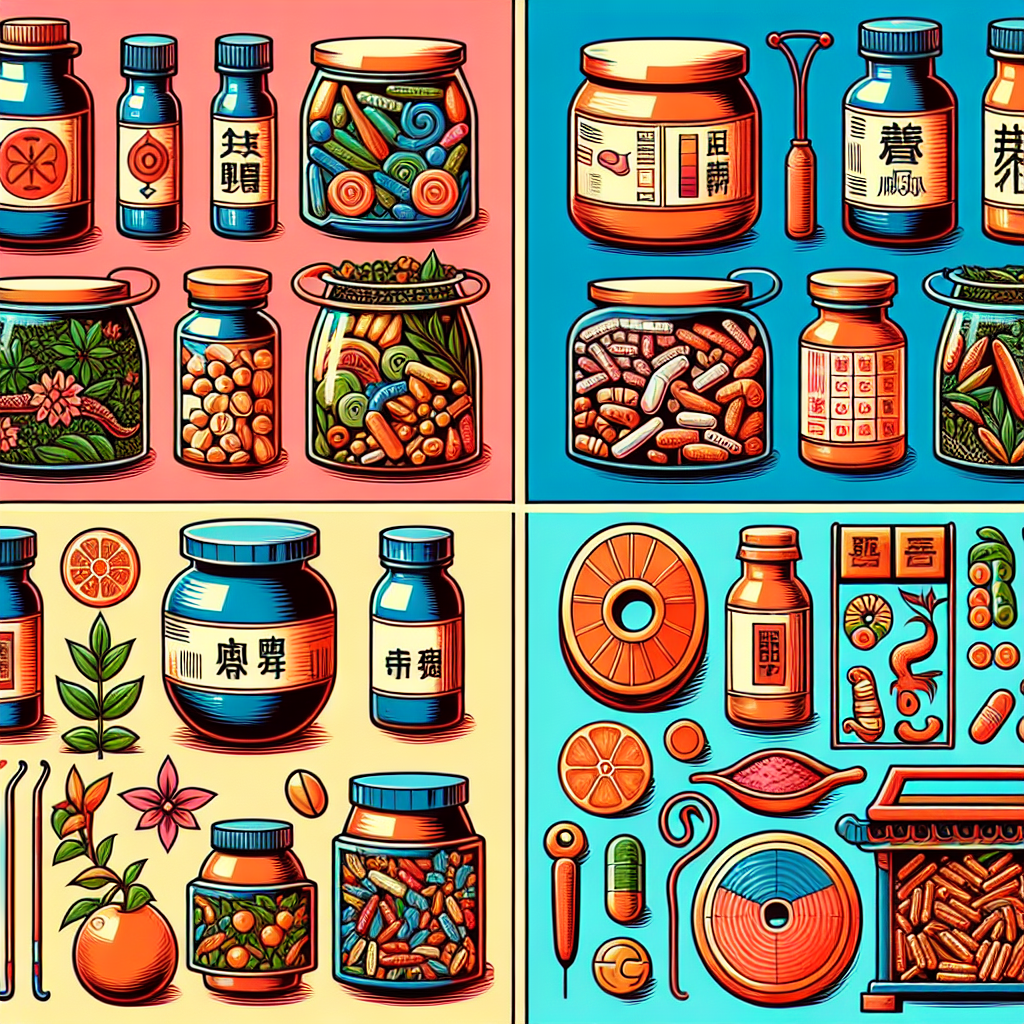Vitamins in Ayurvedic and Traditional Chinese Medicine

Discover the power of vitamins in Ayurvedic and Traditional Chinese Medicine. Unleash your body’s potential for healing and wellness. Visit My Vibrant Vitality now to learn more.
Exploring the Role of Vitamins in Ayurvedic Medicine
Vitamins play a crucial role in maintaining our overall health and wellbeing. They are essential for various bodily functions, including growth, digestion, and nerve function. While modern medicine has made significant strides in understanding the importance of vitamins, traditional systems of medicine, such as Ayurveda and Traditional Chinese Medicine (TCM), have long recognized their value.
Ayurveda, a 5000-year-old system of natural healing that has its origins in the Vedic culture of India, places a strong emphasis on the prevention of disease and the promotion of health. It does this through a holistic approach that includes diet, lifestyle, and herbal remedies. Vitamins, in Ayurveda, are not seen as isolated nutrients, but rather as integral components of the food we eat.
Ayurvedic practitioners believe that the body is capable of producing the necessary vitamins when provided with a balanced diet. This diet is based on the individual’s unique constitution or ‘dosha’, which is determined by a combination of physical, mental, and emotional characteristics. The three doshas – Vata, Pitta, and Kapha – are influenced by the five elements of nature: earth, water, fire, air, and space. Each dosha requires a specific balance of vitamins and other nutrients to maintain optimal health.
For instance, Vata types, characterized by their light, dry, and cold nature, benefit from foods rich in vitamins A and C, which are warming and grounding. Pitta types, on the other hand, with their fiery and intense nature, require cooling vitamins like B and E. Kapha types, known for their heavy, slow, and cool nature, need stimulating vitamins like B and C.
Ayurveda also recognizes the importance of the method of food preparation in preserving and enhancing the vitamin content. For example, Ayurvedic cooking often involves the use of spices, which not only add flavor but also increase the bioavailability of vitamins. Similarly, Ayurveda recommends eating fresh, seasonal, and locally grown foods to ensure maximum vitamin content.
In addition to diet, Ayurveda also uses herbal remedies to supplement vitamin intake. These herbs are often rich in specific vitamins and are used to treat various health conditions. For example, Amalaki, also known as Indian gooseberry, is a potent source of vitamin C and is used in Ayurveda to boost immunity, improve digestion, and promote skin health.
While Ayurveda does not explicitly talk about vitamins as we understand them today, it implicitly recognizes their importance through its emphasis on a balanced diet and the use of vitamin-rich herbs. It is a holistic system of medicine that understands the interconnectedness of all aspects of health, including the vital role of vitamins.
In conclusion, Ayurveda offers a unique perspective on the role of vitamins in health and disease. It emphasizes the importance of a balanced diet tailored to the individual’s unique constitution and the use of herbal remedies to supplement vitamin intake. This holistic approach to health and wellbeing, which includes the recognition of the importance of vitamins, is one of the reasons why Ayurveda has stood the test of time and continues to be relevant today.
Understanding the Importance of Vitamins in Traditional Chinese Medicine

Vitamins are essential nutrients that our bodies need in small amounts to function properly. They play a crucial role in maintaining our health and wellbeing, and a deficiency in any one of them can lead to serious health problems. While modern medicine has made significant strides in understanding the importance of vitamins, traditional systems of medicine, such as Ayurveda and Traditional Chinese Medicine (TCM), have long recognized their value.
Traditional Chinese Medicine, a holistic system of health care that has been practiced for thousands of years, places a strong emphasis on the importance of vitamins. In TCM, the concept of vitamins is not isolated to specific compounds as in Western medicine. Instead, they are viewed as integral components of the foods we eat and the herbs we use for healing.
TCM practitioners believe that the body is a complex system of energy, or Qi, and that maintaining a balance of this energy is key to good health. Vitamins, in this context, are seen as vital sources of nourishment that help to maintain this balance. They are believed to support the body’s natural healing processes, boost the immune system, and promote overall wellness.
For instance, Vitamin C, known in TCM as “sour flavor,” is associated with the Wood element and the liver. It is believed to have a cooling effect on the body and is used to treat conditions such as heat stroke and fever. Similarly, Vitamin D, or “bitter flavor,” is associated with the Fire element and the heart. It is believed to have a warming effect and is used to treat conditions such as colds and flu.
In Ayurveda, the ancient Indian system of medicine, vitamins are also highly valued. Ayurvedic practitioners believe that vitamins, or “rasayanas,” as they are known in Sanskrit, are essential for maintaining the balance of the three “doshas,” or life forces: Vata, Pitta, and Kapha.
Like TCM, Ayurveda views vitamins as integral components of the foods we eat. They are believed to support the body’s natural healing processes, boost the immune system, and promote overall wellness. For instance, Vitamin A, or “retinol,” is associated with the Pitta dosha and is believed to have a cooling effect on the body. It is used to treat conditions such as inflammation and skin disorders.
Both Ayurveda and TCM emphasize the importance of obtaining vitamins from natural sources, such as fruits, vegetables, and herbs, rather than from synthetic supplements. They believe that these natural sources provide a more balanced and holistic form of nourishment that is more easily absorbed and utilized by the body.
In conclusion, while the concept of vitamins in Ayurveda and TCM may differ from that of Western medicine, their importance is universally recognized. These ancient systems of medicine offer valuable insights into the role of vitamins in maintaining health and wellbeing, and their emphasis on natural sources of vitamins is increasingly being validated by modern scientific research. Whether you choose to follow the principles of Ayurveda, TCM, or Western medicine, ensuring that you get an adequate intake of vitamins is essential for your health.
Comparative Study of Vitamins in Ayurvedic and Traditional Chinese Medicine
Vitamins are essential nutrients that our bodies need in small amounts to function properly. They play a crucial role in maintaining our overall health and wellbeing. Interestingly, the concept of vitamins is not new. It has been a part of traditional medicinal systems like Ayurveda and Traditional Chinese Medicine (TCM) for centuries. This article aims to provide a comparative study of vitamins in Ayurvedic and Traditional Chinese Medicine.
Ayurveda, a 5000-year-old holistic healing system from India, emphasizes the importance of a balanced diet for maintaining good health. It does not explicitly mention vitamins, but the concept is implicitly present in its dietary recommendations. For instance, Ayurveda recommends consuming a variety of fruits, vegetables, grains, and spices, which are rich sources of different vitamins. It also suggests specific foods for different body types or ‘doshas’ to ensure a balanced intake of essential nutrients, including vitamins.
On the other hand, Traditional Chinese Medicine, with its roots dating back over 2000 years, also recognizes the importance of vitamins, albeit indirectly. TCM focuses on the concept of ‘Qi’ or vital energy and believes in maintaining a balance of ‘Yin’ and ‘Yang’ energies in the body. It recommends a diet rich in natural foods like fruits, vegetables, and herbs, which are known to be high in vitamins. TCM also uses specific foods as remedies for certain health conditions, many of which are rich in particular vitamins.
While both Ayurveda and TCM do not explicitly mention vitamins, they both emphasize the importance of a balanced diet rich in natural foods, which inherently provide the necessary vitamins. However, there are some differences in their approach to vitamins.
Ayurveda categorizes foods based on their taste or ‘Rasa’ and their effect on the body’s ‘doshas’. It recommends specific foods to balance the ‘doshas’, which indirectly ensures a balanced intake of vitamins. For instance, Ayurveda suggests consuming citrus fruits like oranges and lemons, which are rich in Vitamin C, to balance the ‘Vata’ dosha.
In contrast, TCM categorizes foods based on their ‘thermal nature’ and their effect on the body’s ‘Qi’. It recommends specific foods to balance the ‘Qi’, which indirectly ensures a balanced intake of vitamins. For example, TCM suggests consuming foods like spinach and liver, which are rich in Vitamin A, to nourish the ‘Yin’ energy.
In conclusion, both Ayurveda and Traditional Chinese Medicine recognize the importance of vitamins for maintaining good health, albeit indirectly. They both emphasize a balanced diet rich in natural foods, which inherently provide the necessary vitamins. However, their approach to ensuring a balanced intake of vitamins is different, with Ayurveda focusing on balancing the ‘doshas’ and TCM focusing on balancing the ‘Qi’. Despite these differences, both systems underscore the importance of vitamins in maintaining overall health and wellbeing. Therefore, understanding the role of vitamins in these traditional medicinal systems can provide valuable insights into maintaining good health in a holistic and natural way.